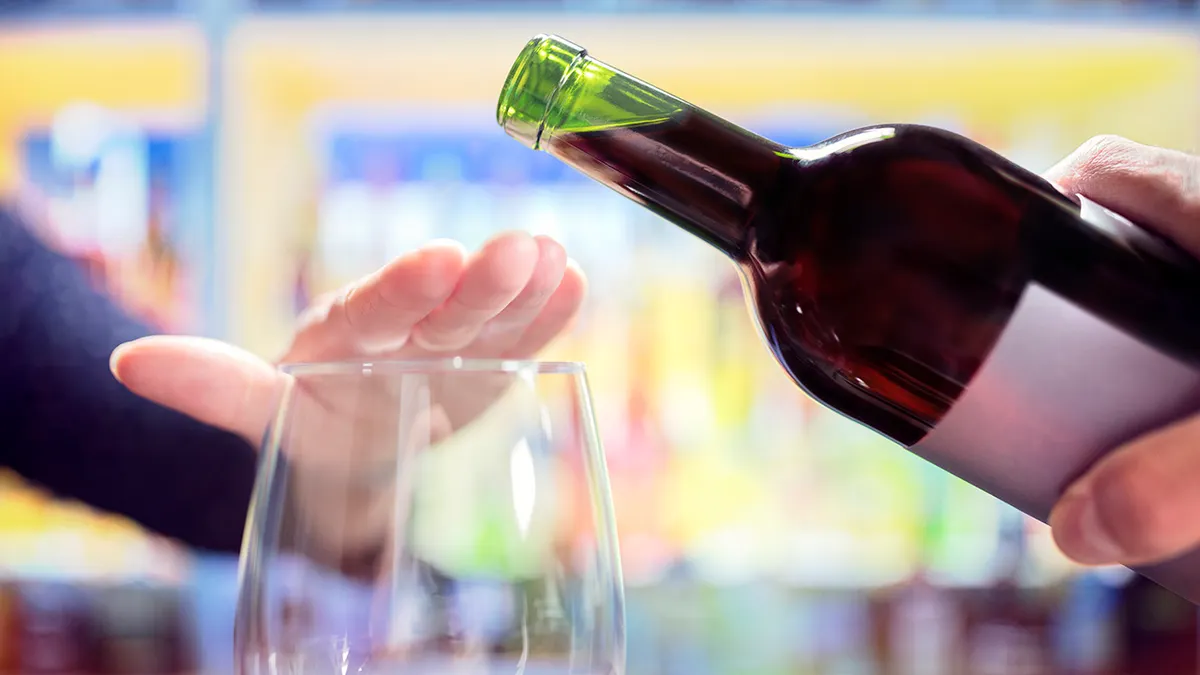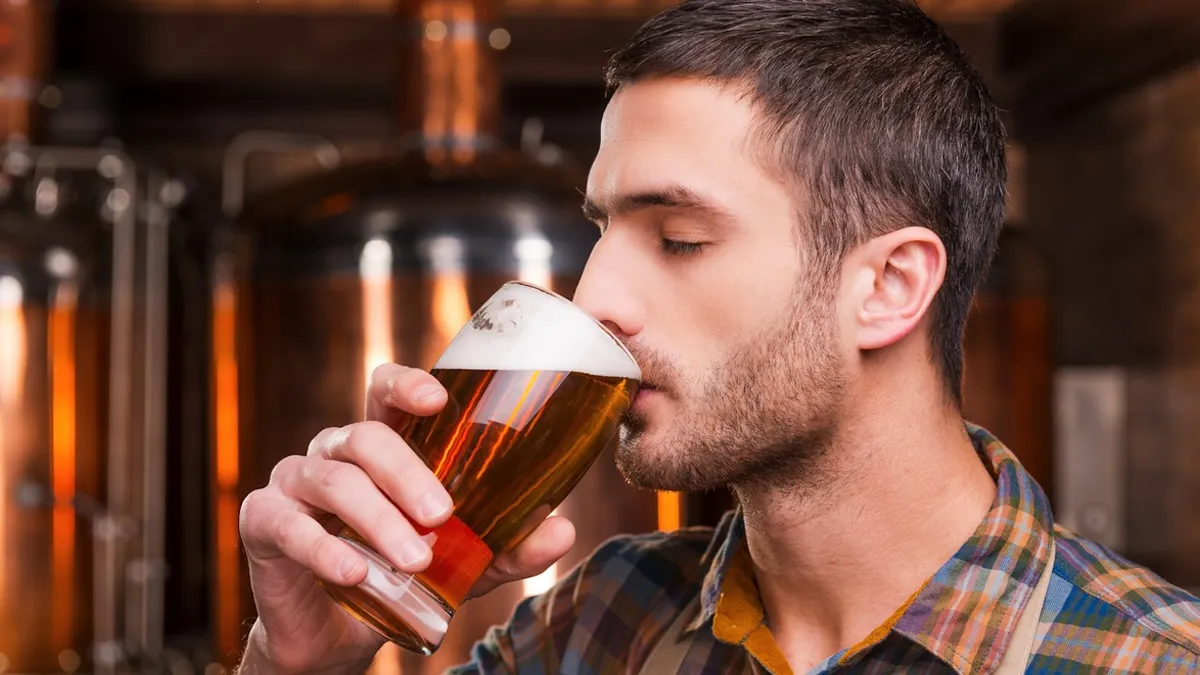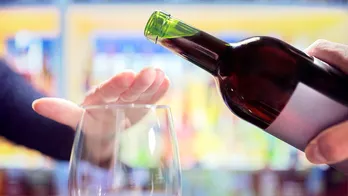U.S. Surgeon General Dr. Vivek Murthy warned in a recent advisory about alcohol use increasing cancer risk.
The advisory notes that alcohol can increase the risk of throat, liver, esophageal, mouth, larynx (voice box), colon and rectal cancers, making it the "third leading preventable cause of cancer" in the U.S.
This guidance follows the rise of the "sober curious" trend, with younger generations scaling back on how much they drink or choosing not to partake at all.
ALCOHOL LINKED TO CANCER RISK IN US SURGEON GENERAL'S NEW ADVISORY
For those who are interested in curbing their alcohol use, here are six tips on how to do so safely.

1. Analyze your alcohol dependence
Alcohol is "one of the most serious substances" when it comes to detoxification, sometimes requiring medical hospitalization to manage withdrawal symptoms, according to Dr. Chris Tuell, clinical director at the Lindner Center of HOPE in Mason, Ohio.
Tuell, who is also an associate professor at the University of Cincinnati College of Medicine in the Department of Psychiatry and Behavioral Neuroscience, recommended speaking to a primary care physician before discontinuing years of extreme alcohol use.
DOES ‘DRY JANUARY’ ACTUALLY IMPROVE YOUR HEALTH? HERE'S WHAT TO KNOW
Dr. Adi Jaffe, PhD, CEO of addiction recovery platform IGNTD in Los Angeles, noted that in some cases, it may be "medically inadvisable to just quit" if alcohol dependence is severe.

"You must consult with a medical professional before stopping," said Jaffe, author of the book "Unhooked." "This is especially true if you get tremors, shaking or sweatiness when you don't drink, even for a day or two."
"Those are markers of somebody who's more likely to have a grand mal seizure if they just stop cold turkey."
2. Set clear goals and track patterns
For people who haven’t had a "necessarily problematic" relationship with alcohol and are just looking to cut back, Tuell recommended setting clear goals to get there.
DRINKING ALCOHOL IS LINKED TO CANCER, EXPERTS SAY
"With any behaviors that you plan to change, what are clear, realistic and specific goals on how much or how often you plan to drink?" he asked.
"Perhaps you have the goal of only drinking on weekends, or perhaps you limit the amount of alcohol to two drinks per occasion."

Tuell suggested tracking your drinking by keeping a journal of when, where and how much you drink.
"This helps to identify patterns or triggers that may be associated with your mood, such as work stress or family stress and anxieties," he said.
Planning alcohol-free days and then gradually increasing the number of those days each week can be effective, the expert added.
3. Avoid triggers and find alternatives
After tracking when, where and how much you drink, it may become clear what triggers you to drink.
Tuell encouraged identifying these situations, emotions and behaviors and finding alternative ways to handle them.
‘ALCOHOL GENE’ COULD PREDICT HOW COCKTAILS MAY AFFECT YOU — AND THERE’S A TEST FOR IT
"These triggers will frequently lead to behaviors that give us relief and/or a reward, and many times it is not a healthy way of coping," he said.
"Choose non-alcoholic beverages in social settings … like sparkling water, mocktails or herbal teas, to satisfy the habit of having a drink … or avoid places where heavy drinking occurs."

Jaffe commented that focusing on less drinking won’t be as effective as drinking something else, like a non-alcoholic drink, or doing a different activity instead.
SEVERE HEALTH RISKS OF VAPING AND E-CIGARETTES, ESPECIALLY FOR YOUTH, SAY EXPERTS
Tuell agreed that finding a healthier alternative to bad behaviors is a good way to stop them.
This could include stress-relieving practices like exercising, reading, journaling or spending more time with supportive friends.

Movement, mindfulness exercises and meditation can also be helpful practices throughout the day, according to Jaffe.
"You can do those practices while you're brushing your teeth or while you're making your coffee," he said. "Meditation practices as short as five or 10 minutes can have an incredible impact on your stress response in life."
4. Change your environment
Removing temptations from your environment is a good way to prevent reaching for them, according to experts.
TO SIGN UP FOR OUR HEALTH NEWSLETTER
Tuell suggested removing alcohol from your home or limiting activities that make it more accessible, such as hanging out at bars.
"Smell is the strongest of the five senses connected to memory," he added.
 Video
Video
Jaffe agreed that environment "plays a massive role" in how people interact with alcohol.
"If you're looking to reduce your drinking … having other people who are participating in the journey with you will go a long way toward helping you meet your goals of reduction."
5. Practice saying ‘no’ and surround yourself with support
The social pressures of drinking can be a trigger, but learning to say "no" is powerful. Tuell recommended being prepared with a "polite but firm" response in situations where you might feel pressured to drink.
‘I’M A PSYCHOLOGIST – HERE'S HOW TO FINALLY BREAK YOUR BAD HABITS'
This can be as simple as, "No, thanks, I’m taking a break from drinking" or "I’m good, thanks."
Tuell advises surrounding yourself with supportive individuals, like trusted friends or family members with whom you can share your goals.

He also suggested joining a support group, "like Alcoholics Anonymous, SMART Recovery, Celebrate Recovery or Women for Sobriety."
"If you are one of the 40% of Americans who is trying to stop alcohol use, sometimes it may be necessary to seek counseling services."
For more Health articles, visit foxnews.com/health
Tuell also mentioned that methods like cognitive behavioral therapy can be effective.
6. Be kind to yourself
Reflecting on the reasons you're looking to reduce alcohol intake — whether it's to improve your health, save money, strengthen relationships or another motivating factor — can help keep you on the right path, according to Tuell.
He also encouraged celebrating milestones by enjoying something non-alcohol-related, such as a massage, a round of golf, a shopping trip or another fun outing.
"To make changes, it takes time," Tuell said. "Setbacks are normal. So be kind to yourself and focus on progress, not perfection."

While about 40% of people quit their New Year’s resolutions before the end of January, according to Jaffe, the specialist said it's important to not be discouraged by slip-ups.
"Learn from it and just keep going," he advised.
Related Topics
- Health
- Addiction
- Alcohol
- Non-Alcoholic Drinks
- Mental Health
- Lifestyle
- Cancer
- Spirits
- Healthy Living







.webp)
.webp)

